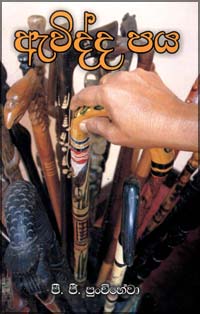|
Focus on Books:
Resourceful travel notes
Prof. Sunanda Mahendra
Title:
Evidda Paya
Author:
P G Punchihewa.
Publisher:
Stamford Lake,
2008.
Page count: 277
Price: Rs. 415.
There is a well known saying in Sinhalese which means that the feet
which had travelled much are worthy, while the same when stayed at home
are worthless. Punchihewa takes out a section of the traditional
Sinhalese saying to heighten how very worthy the travelling from country
to country is. In this direction as a senior administrator who had
served a long period in the public service at home and abroad,
Punchihewa had covered forty-seven countries to his credit experiencing
the process of observation and participation.

Perhaps this may be a very rare opportunity which is destined by many
a present day administrator, for as I see most of them are bogged down
to their routine official duties bowing their head in agreement to the
tune of the political song they hear regularly. In the end what do they
possess? Some of course grab the opportunity of becoming consultants
once again to politicians or becoming mightily rich with property.
I see an entirely changed person in the calibre of P G Punchihewa,
the data collector and the creative narrator and interpreter is seen
methodically planning his work with the intention helping the reader to
obtain insights to the various countries he had traveled. In this sense
this piece could well be reckoned as travelogue or travel notes.
He covers such countries in the areas of Europe where he presents his
maiden travelling session to Poland. From there he goes to UK, Denmark,
Czechoslovakia, Hungary, Germany, France, Holland and Greece. In each of
these places he tries his best to present a general picture of the
demographics with a selective eye on a personal experience. At times
this personal experience may be seen as a racial discrimination or an
under treatment which in the last resort adds a plus sign for the notes.
But his is not seen more often for the writer is more inclined to be
impartial about social issues. From the Eastern European sector, he
travels on to see pyramids which he read in books during school days,
enriching a reality. From there he makes duty visit to Ghana, and
embanks on some resourceful project pertaining to plantation.
There are duty trips as well as holiday relaxed trips covered in the
work of Punchihewa. He presents Alaska, Canada, Mexico, Brazil, Jamaica
as places which uncovered some of the latent travel inclinations that
lay buried in his mind. For most of us who have had no opportunity of
this nature in traveling from place to place this work becomes a mirror
in many ways, especially for the student of environmental matters and
social issues. I felt a certain degree of freshness in the area of
observation nearer my heart on reading the accounts on the Pacific
islands, New Zealand, and Australia. There were several witty and eye
opening experiences gathered from these place a resourceful encounters,
in diversity.
Then we come to a more intimate cultural scene as the writer takes us
to Nepal, the birthplace of the Buddha, and a few other places in the
Asian region. His travels take us to such places as Indonesia, Bali,
Singapore, Thailand, Malaysia, Vietnam, Campuchia and Myanmar.
At times the reader feels that the travel notes Punchihewa presents
in his pages are more of figures and demographic details than actual
human interest stories.
I would have preferred to see more of the latter as sensitive and
creative reading materials that links up the diversity in human groups.
But may it be said in good will that one's own mode of expression cannot
be forced to change in keeping with the desirous trends of others. When
all these are stated, the book also looks a fact file pertaining to
various cultures are social orders. Jotting down some of the
observations while spending time in Greece, a reader of my calibre would
have preferred to know more of the present conditions of culture and
people. But unfortunately browsing the material presented I simply found
a mere displaying of such names as Socrates, Archimedes, Euclid, Homer
and Herodotus. But the writer uncovers the fact that it is the Greeks
who visualised the footprint of the Buddha and the design of the Buddha
statue. It may also be the limited time factor where Punchihewa my not
have found more time to rediscover Greece, as he does in other
instances. As he records in the last chapter recalling the time he had
spent abroad, it is there had been the inner urge to come back to his
motherland. Now that he had done so it is these reminiscences that help
him to keep alive.
The writer who had spent seventeen years away from the motherland,
had been eagerly waiting to return.
Perhaps at last, needless to say, a senior administrative officer in
retirement finds his leisure profitably spent, especially to write this
book in a surrounding which he admires so much, that is his own
motherland, Sri Lanka. |



